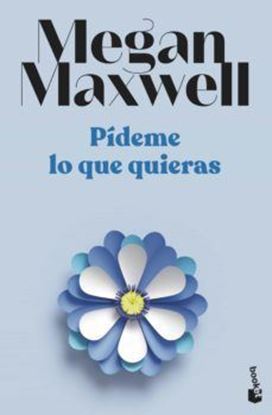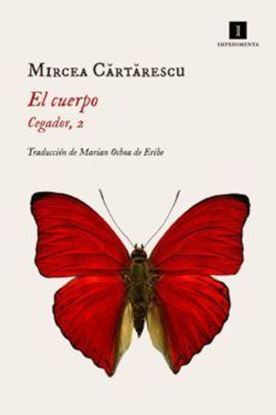

PIDEME LO QUE QUIERAS, AHORA (2) (BOL)
Pídeme lo que quieras, ahora y siempre es el segundo volumen de la serie erótica más adictiva de Megan Maxwell.
Después de provocar su despido de la empresa Müller, Judith está dispuesta a alejarse para siempre de Eric Zimmerman. Para ello decide refugiarse en casa de su padre, en Jerez. Atormentado por su marcha, Eric le sigue el rastro. El deseo continúa latente entre ellos y las fantasías sexuales están más vivas que nunca, pero esta vez será Judith quien le imponga sus condiciones, que él acepta por el amor que le profesa. Todo parece volver a la normalidad, hasta que una llamada inesperada los obliga a interrumpir su reconciliación y desplazarse hasta Múnich. Lejos de su entorno, en una ciudad que le resulta hostil y con la aparición del sobrino de Eric, un inesperado contratiempo, la joven tendrá que decidir si debe darle una nueva oportunidad o comenzar un nuevo futuro sin él.
Pídeme lo que quieras, ahora y siempre es una intensa historia de amor, plagada de fantasías sexuales, morbo y erotismo, en la que los protagonistas hablan cara a cara con la pasión.
850
638
PIDEME LO QUE QUIERAS (NUEVA ED.) (BOL)
Pídeme lo que quieras es el primer volumen de la serie erótica más adictiva de Megan Maxwell.
Tras la muerte de su padre, el prestigioso empresario alemán Eric Zimmerman decide viajar a España para supervisar las delegaciones de la empresa Müller. En la oficina central de Madrid conoce a Judith, una joven ingeniosa y simpática de la que se encapricha de inmediato. Judith sucumbe a la atracción que el alemán ejerce sobre ella y acepta formar parte de sus juegos sexuales, repletos de fantasías y erotismo. Junto a él aprenderá que todos llevamos dentro un voyeur, y que las personas se dividen en sumisas y dominantes... Pero el tiempo pasa, la relación se intensifica y Eric empieza a temer que se descubra su secreto, algo que podría marcar el principio o el fin de la relación.
Pídeme lo que quieras es sin duda una novela atrevida, en la que el morbo y las fantasías sexuales están a la orden del día.
900
675
LOS ABISMOS (PA21)
Claudia vive con sus padres en un apartamento invadido por plantas que se estiran para tocarla. Como todas las familias, la suya contiene una crisis, y solo hará falta que algo o alguien llegue a detonarla.
Cada quien tiene un punto de quiebre en la infancia, y Claudia, la protagonista de esta historia, narra, desde la expectación y la mirada aguda de cuando fue una niña, los hechos que abrieron las grietas por donde se colaron los peores temores, aquellos que son irreversibles y empujan al borde del precipicio.
Los abismos es un relato estremecedor en el que una hija asume las revelaciones de su madre y los silencios de su padre para empezar a construir su propio mundo. Tras el éxito de La perra, con esta novela, Pilar Quintana consolida el importante lugar que ha conquistado en las letras hispanoamericanas.
«Los abismos se adentra en la oscuridad del mundo de los adultos a través del punto de vista de una niña que, desde la memoria de su vida familiar, intenta comprender la conflictiva relación entre sus padres. Con el telón de fondo de un mundo femenino de mujeres atadas a la rueda de una noria de la que no pueden o no saben escapar, la autora ha creado una historia poderosa narrada desde una aparente ingenuidad que contrasta con la atmósfera desdichada que rodea a la protagonista. Con una prosa sutil y luminosa en la que la naturaleza nos conecta con las posibilidades simbólicas de la literatura, y los abismos son tanto los reales como los de la intimidad.»
995
746
EL CUERPO. CEGADOR 2
«El cuerpo» es el edificio central de la deslumbrante trilogía CEGADOR. Un libro inabarcable, caleidoscópico e intelectualmente subversivo que constituye un hito en la historia de la literatura europea. Bucarest a mediados de los años 60: Rumanía está dominada por el Partido. Mircea acaba de cumplir ocho años y en su mente se fusionan el presente y el pasado: el lúbrico Vasile, el muchacho que creció sin sombra; la niña Maria, a la que le crecen unas alas de mariposa; las alfombras cúbicas tejidas por la madre de Mircea, que ocultan secretos de Estado; la mística aparición, en la Alameda del Circo, del Hombre Serpiente; Mircea y su hermano Victor, acurrucados cada uno con la cabeza a los pies del otro; los hombres estatua que pueblan las entrañas de una Amsterdam con cielos color rubí…La fabulosa segunda entrega de la trilogía «Cegador», la obra que encumbró a Cartarescu a la fama. Una experiencia literaria total, deslumbrante y transformadora.
995
746
ORGULLO Y PREJUICIO (ALBA) (TB)
Edición conmemorativa del Bicentenario de su publicación.
Una edición al alcance de todos los bolsillos de una de las novelas románticas más importantes de la historia de la literatura universal.
«Es una verdad universalmente aceptada que todo soltero en posesión de una gran fortuna necesita una esposa.» Así empieza Orgullo y prejuicio, una de las primeras comedias románticas de la historia de la novela, publicada, por primera vez, el 28 de enero de 1813.
El señor y la señora Bennett tienen cinco hijas, y el único objetivo de la madre es conseguir una buena boda para todas. Dos jóvenes ricos, el señor Bingley y el señor Darcy, aparecen en ese ambiente e inmediatamente se ven señalados como posibles maridos.
1,100
825












